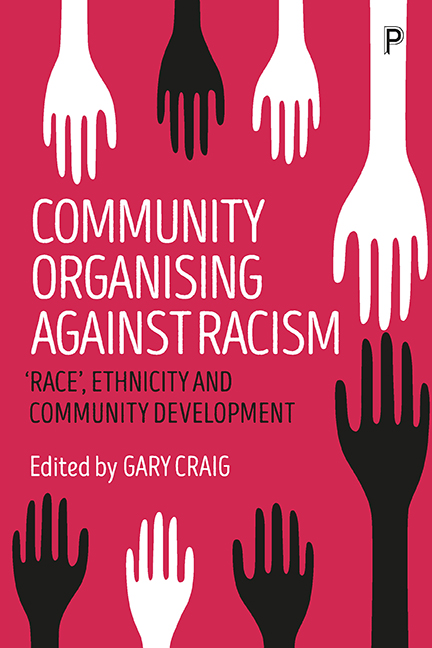Book contents
- Frontmatter
- Dedication
- Contents
- List of figures
- Author biographies
- List of abbreviations
- Introduction
- Section One Community development with ethnic minorities: history, theory, policy
- Section Two Building capacity with BME groups
- Section Three Working with Roma communities
- Section Four Global experience
- Section Five Working across cultural boundaries: ideological and personal reflections
- Afterword: Messages for community development in working with minority groups
- Index
Section Five - Working across cultural boundaries: ideological and personal reflections
Published online by Cambridge University Press: 12 April 2022
- Frontmatter
- Dedication
- Contents
- List of figures
- Author biographies
- List of abbreviations
- Introduction
- Section One Community development with ethnic minorities: history, theory, policy
- Section Two Building capacity with BME groups
- Section Three Working with Roma communities
- Section Four Global experience
- Section Five Working across cultural boundaries: ideological and personal reflections
- Afterword: Messages for community development in working with minority groups
- Index
Summary
The two concluding chapters have been given a separate section because they present some very personal reflections from community workers who have confronted the difficulties in practice of working across cultural boundaries in a way that has challenged their view of the object of community development and the ideology that underpins it, and assumptions about their own identity as a community development worker operating within a challenging cross-cultural context.
Belton's view of the value of community development with/to minority ethnic groups, based on widespread experience in countries both with ‘developed’ and ‘developing’ economies and with the most marginalised groups, such as the Roma in East and Central Europe, is, perhaps appropriately for such a contested subject, at best ambivalent and at times even highly sceptical. Drawing on the work of liberation writer-activists such as Franz Fanon and Ivan Illich, and on the disciplinary analysis of Foucault, he argues that, without exerting great care and reflexivity, community workers are open to the charge of reproducing the attitudes and practice of their colonial predecessors with communities labelled as suffering from economic, political and social deficits and ‘underdevelopment’, a stance that is legitimised by racism and prejudice and that dismisses the culture and history of minorities as without value. Those with power thus blame the marginalised for their marginalisation, rather than accepting that they are the victims of the operations of a racist state.
Summersgill writes, in a very moving personal account, about the tensions of moving from a country formally acknowledged as multicultural, in which she was seen as mixed-race and thus, in essence, ‘BLACK’, to be a community worker in the unique context of a country – New Zealand/Aotearoa, the land of the long white cloud – that, while historically and culturally defined as bicultural (with the Treaty of Waitangi balancing the rights of the indigenous Māori against the power of the imperial invaders from Britain), is now increasingly, in a strictly demographic sense, multicultural, as migrants – both economic and those seeking refuge – have arrived from many new destinations, including Europe, Africa and Asia.
- Type
- Chapter
- Information
- Community Organising against Racism'Race', Ethnicity and Community Development, pp. 291 - 292Publisher: Bristol University PressPrint publication year: 2017

